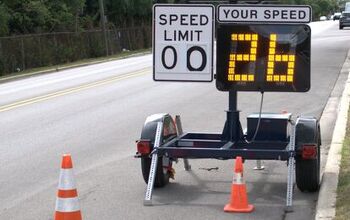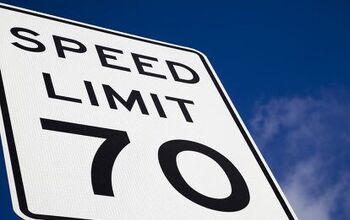The Speed Limits of Democracy
I like to drive fast. I don't think I'm breaking new rhetorical ground to suggest that anyone who likes to drive fast violates the speed limit from time to time. In fact, depending on your predilection for automotive velocity, "from time to time" easily becomes "all the time." There are plenty of ways to justify chronic speeding: posted speed limits are unrealistic (set low to reflect average vehicles' and drivers' capabilities), they're a guideline rather than an absolute indication of safe speed (which don't reflect variable conditions such as weather, road surface, traffic, etc.), they're relatively unimportant (compared to inattentive, reckless or drunk driving) and the vast majority of motorists exceed them anyway. Strangely, the last excuse is the most potent.
It's a bizarre concept for a democratic government: enact and enforce a law which the majority of people don't obey. It gets even stranger when you consider the fact that the majority of citizens support the law that they know they don't obey (hence its creation and continuation). Of course, the speed limit is not the first or best example of this hypocritical happenstance. From 1920 to 1933, America lived under the strictures of the Eighteenth Amendment to the US Constitution. Despite popular support for the "prohibition" against the sale and distribution of alcohol, Americans kept on drinking. In the same sense, American motorists kept driving above 55mph when Richard Nixon's administration used federal highway funds to force the states to adopt a “national” speed limit.
In both cases, arguments for the legislation were logical and coherent. There's no question that alcohol was/is America's most destructive drug, blighting the lives of millions, disrupting our economic efficiency and causing thousands of fatalities. There's also no question that driving 55mph was/is an excellent way to save billions of gallons of imported oil. (I might even spot you the national speed limit's positive effect on highway fatalities– if it were actually true.) But no matter how you slice it, neither law significantly curtailed the proscribed behavior. This made enforcement a horrendously expensive, Sisyphusian task.
One of the key differences between Prohibition and unobserved speed limits is that the latter is self-financing. One wonders if Prohibition might have lasted longer if the government agencies in charge of its enforcement had received the financial fruits of current RICO statutes, which provide for confiscation of criminal assets. In contrast, police who write speeding tickets can use the money to pay for police who write speeding tickets. This being America, it’s not quite that straight forward. Speeding tickets fall under local and state jurisdiction; the revenues generated are often subject to “land grabs” by money hungry local legislators.
In England, it is that simple. The national government has “ring fenced” the money generated by speeding tickets: mandating that local “safety camera partnerships” must spend the revenue from speed enforcement on speed enforcement. This supposedly virtuous circle has led to an explosion of speed cameras, a huge increase in speeding tickets and a very nasty unintended consequence. Just as Prohibition eroded the American public’s respect for law and law enforcement, the United Kingdom’s extremely effective anti-speeding jihad has undermined the public’s respect for the police.
At the risk of alienating road safety-minded readers, many of whom have suffered personal losses from traffic fatalities, the issue of the public’s faith in its police force is far more important than speed-related road safety. When a law criminalizes a behavior practiced by the majority of its citizens, it criminalizes its citizens. When the police rigorously enforce this law, hypocritically enough, the public comes to resent the police. Keep in mind that most people never encounter their police force; speeding tickets written “when I wasn’t really doing anything wrong” do nothing to engender a relationship of mutual respect.
Unlike Prohibition, there is no obvious answer to this state of affairs; you can’t simply “repeal” (i.e. abandon) speed limits. Or can you? If you ask the average Joe if they think police should write speeding tickets only in those situations where a motorist was driving “faster than was safe for the prevailing conditions” you’d have little to no disagreement. That kind of policy would require judicious human enforcement by officers prioritizing road safety, rather than revenue collection. It would be far more expensive that a passive device snapping off tickets to anyone and everyone violating an inflexible, predetermined speed limit.
In the US, the aggressiveness of speed enforcement varies widely. Certain states are now experimenting with speed cameras, blundering straight into the old axiom that those who do not learn from history are condemned to repeat it. Meanwhile, the situation in the UK seems to be reaching some sort of breaking point, with anti-speed camera campaigners gaining public sympathy and support. The country is learning that public policy based on moral posturing, rather than common sense and real world behavior, is doomed to failure.
[podcast is with Paul Smith, founder of the UK's Safe Speed ]
More by Robert Farago
Latest Car Reviews
Read moreLatest Product Reviews
Read moreRecent Comments
- Sayahh I do not know how my car will respond to the trolley problem, but I will be held liable whatever it chooses to do or not do. When technology has reached Star Trek's Data's level of intelligence, I will trust it, so long as it has a moral/ethic/empathy chip/subroutine; I would not trust his brother Lore driving/controlling my car. Until then, I will drive it myself until I no longer can, at which time I will call a friend, a cab or a ride-share service.
- Daniel J Cx-5 lol. It's why we have one. I love hybrids but the engine in the RAV4 is just loud and obnoxious when it fires up.
- Oberkanone CX-5 diesel.
- Oberkanone Autonomous cars are afraid of us.
- Theflyersfan I always thought this gen XC90 could be compared to Mercedes' first-gen M-class. Everyone in every suburban family in every moderate-upper-class neighborhood got one and they were both a dumpster fire of quality. It's looking like Volvo finally worked out the quality issues, but that was a bad launch. And now I shall sound like every car site commenter over the last 25 years and say that Volvo all but killed their excellent line of wagons and replaced them with unreliable, overweight wagons on stilts just so some "I'll be famous on TikTok someday" mom won't be seen in a wagon or minivan dropping the rug rats off at school.


































Comments
Join the conversation
I came up with an idea that started as a joke, but the more I think about it the more I like it. Stay with me here. Whenever the technology is available, give every driver during a 24 hour period the ability to alter the power delivery in other cars 10 times: 5 increases and 5 decreases, 10% each time. So, a mom in an SUV is on her cell phone and swerves in front of you, you zap her ECU and her power is cut by 10%. A nut job is veering dangerously through traffic on a highway at 95 mph, maybe 10 people zap him and he's on the side of the road for a "time out". Someone yields to allow you to merge, you increase his power by 10% (maybe to help him get back to full power after cutting someone off earlier). Oh, and one driver can't zap another driver more than a single 10% shot, so it's a consensus thing. This is either the dumbest idea ever, or sheer genius, I can't tell. Anyhow, inattentiveness is the #1 driving safety issue. Driving is the one area where we can easily kill someone by accident just going about our business. But most drivers don't act like they're engaged in a dangerous activity. People generally don't know the rules of the road either. That matters when there's more traffic on our roads than said roads were designed to handle. For example, how many times do you see a group of 20 cars driving in a NASCAR restrictor plate racing pack on an otherwise sparsely travelled highway? Ridiculous.
Speed Limit Fun And Games Recently my fiancee's daughter was weaping and wailing about her tickets exceeding 35 mph. I told her to shut up, and said I drive faster and farther then anyone else I know, and have not had a ticket in more then 150,000 miles, and never had an accident at greater then parking lot speeds (last one 1974). In the last month alone I have twice hit the speed limiter on my supercharged Lincoln Mark VII. IMHO, the number of speeding tickets you get and accidents you suffer is directly proportional to your inattentiveness behind the wheel. If you pay attention to DRIVING you will not have accidents OR tickets.